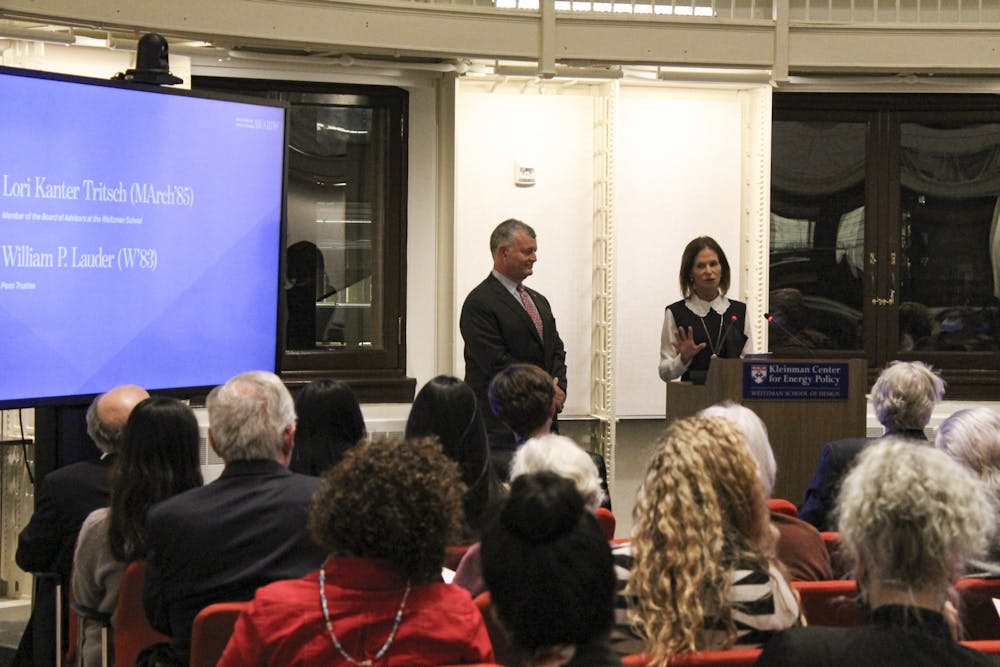
A $50,000 scholarship was awarded to two students entering their final year of study by the Stuart Weitzman School of Design.
Credit: Sheil DesaiThe Stuart Weitzman School of Design selected two students entering their final year of study to receive a $50,000 scholarship to put towards their education.
The recipient of the 2021 Witte-Sakamoto Family Prize in City and Regional Planning is Xuezhu "Gillian" Zhao, who is in the Master of City Planning program with a concentration in smart cities. The recipient of the 2021 Kanter Tritsch Prize in Energy and Architectural Innovation is Beikel Rivas, who is studying in the Master of Architecture program.
The awards are given to recognize the achievements of innovative Weitzman students, faculty, and alumni, as well as leaders in architecture and planning outside of the Penn community. Applicants are evaluated blindly by a jury based on the merit of the portfolio that they submit, School of Design Dean and Paley Professor Frederick Steiner said during the event.
Zhao won the award for her portfolio, which focused on data analytics and planning citizen-centric cities. She has studied the evolution of smart city planning from the early 1900s to the present, considering the importance of data and technology in improving pluralism and planning, City and Regional Planning Chair Lisa Servon said on behalf of assistant professor Allison Lassiter, who leads the smart cities concentration within the department.
“Gillian [Zhao] is a curious and creative scholar who was able to expertly draw together seemingly disparate fields within planning. She takes a human-powered approach in her analyses exploring how data and technology can lead to better cities for people,” Servon said on behalf of Lassiter.
Zhao said studying urban planning is very personal to her because of her experience growing up in Beijing.
“I always noticed the changes and the different developments around me as I grew up, because [Beijing] is a fast-developing city,” Zhao said.
Zhao chose to attend the School of Design because of the Urban Planning Program’s focus on data and technology. After studying city planning from a policy standpoint during her undergraduate career, she grew interested in the role of informatics and technology on city dwellers.
She added that studying urban planning made her unsure if she would be able to pay off her education compared to other degrees, such as business. She ultimately decided to study urban planning due to her passion for the subject.
“Earning this award means that my passion — what I want to study — is being recognized,” Zhao said. “It is motivation for me to be determined that I picked the right field for myself.”
Rivas, who is an immigrant from Venezuela and a first-generation college student, has been passionate about architecture for a long time.
“I wanted to be an architect since I was six years old. I used to draw a lot and, especially, I used to draw buildings and spaces,” Rivas said in a video profile shown at the event.
Many of the projects in Rivas’ portfolio focused on how people can learn from nature to solve issues of sustainability and develop new, environmentally friendly ways of design.
“Beikel was definitely the most talented, not only in design work and his in-depth presentation, but also the overall consistency of the years of [his] work,” Miller Professor and Architecture Chair Winka Dubbeldam said.
Rivas said that he is most excited by the creative aspects of architecture, which make him feel like he is both an artist and a scientist.
“The School [of Design] pays more attention to creativity compared to other design schools,” Rivas said. “They value the uniqueness of the students and you can see that in the work [of the students] that is always experimental.“
Rivas said the scholarship has provided relief to his financial struggles as an immigrant to the United States.
“Where I come from, it is kind of impossible to imagine that you would be in a school like this and excel in a school like this,” Rivas said. “It puts me in a position to serve as an example to other students like me who don't have the resources, that they could make it in a school like this.”
The Daily Pennsylvanian is an independent, student-run newspaper. Please consider making a donation to support the coverage that shapes the University. Your generosity ensures a future of strong journalism at Penn.
Donate



